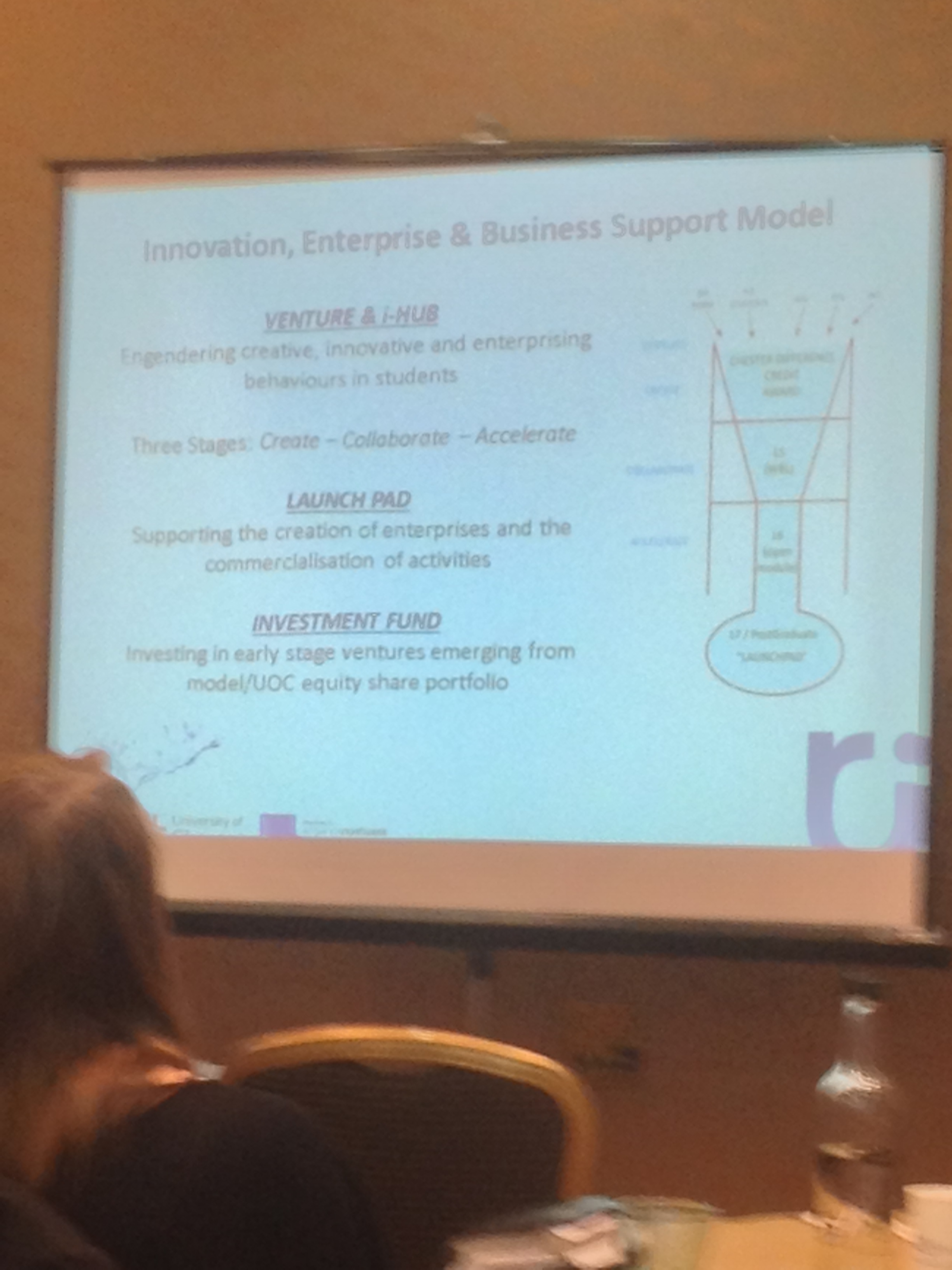15 July 2014 and I’m in Leeds attending The National Centre for Entrepreneurship in Education (NCEE) Student/Graduate Start-up Support and Enterprise Talent Development Programme seminar (bit of a mouthful but bear with, it’s interesting stuff).
I’m involved in the Jisc ‘Summer of Student Innovation’ initiative.
We identify ideas for IT based enhancements to the student experience from students themselves, support them through a series of 3 day expert led entrepreneurship based boot camps, provide mentorship and peer action learning, run a showcase event, shortlist for potential ‘transition to service’ projects and identify partnership opportunities going forward to provide services to the Jisc membership.
See http://www.jisc.ac.uk/student-innovation for the 2013 and 2014 initiatives.
So I’m hoping to see overlaps and perhaps identify opportunities…..
The sessions describe examples of what has been done in the North of England Region of NCEE and introduce the June 2014 Lord Young report ‘Enterprise for All’

Session 1 – Benefits, Impacts and Learning from the North West Enterprise Champions Project Dr Simon Brown
The NCEE is an accountable body supported by the North West European Unit via the European Regional Development Fund (ERDF). Delivery partners are Bolton, Chester, Liverpool, Salford, UCLAN, Edge Hill, Lancaster, Liverpool John Moores. A programme has been running since 2007, so in its 7th year with an extension granted. The programme aims were to work through University leaders to develop more entrepreneurial cultures in member institutions. The outputs would include addressing the low-level of graduate startups. Methodologies include;
-
Enhance understanding of what it takes to create more graduate start ups
-
Feed good practice into curricula and extra curricula
- Build expertise
- Enhance the regional economy
These were not seen as core aspects of University business. A key aim here is to make this so.
The latest phase has focused on 1353 pre-start assists, 266 new business, 333 new jobs.
Evaluations on the programme have shown;
That Universities with strong research excellence tend to engage aspirant entrepreneurs via extra curricula activities. Those with more vocational programmes tend to engage through the curriculum.
-
Everyone is having difficulties in getting the messages to the students – whatever channels tried. Ditto for tutors.
Jisc have found that whatever channels are employed, word of mouth and social networking seem the most effective methods to reach students.
The timing of getting the messages across is key – posters are often prevalent, but students and staff interest window is peaked at certain stages and so ‘keeping the message going’ is important. Jisc is considering keeping the ‘Elevator’ (the site we use to collect proposals from students) live all year round with a window of selection so this seems appropriate.
‘Employability’ is being talked more openly in institutions from prospect to graduate and is a driver, however enterprise and entrepreneurship (which as phrases can frighten people off) should be a set of graduate attributes, not a career path.
Entrepreneurship needs to be stated in key University strategies, owned by a member of SMT, devolved through ‘Champions’, linked to business, celebrated and measured for impact. So n that sense not different to most new initiatives aiming to amend and embed institutional culture.
Session 2 – University benefits and impacts: The University of Chester experience Paul Kirkbright
Chester set out a strategic vision, a typology for innovation and enterprise, a survey (which found the vast majority of students want to work for themselves at some point in their careers), instigate a culture change programme, support the creation of a ‘society’ with;
240 students actively participating in enterprise activity
130 in pre start activity
etc
And an Innovation, Enterprise and Business Support Model

Note ‘Create, Collaborate, Accelerate’ embedded in various aspects of institutional culture. The earliest stages are funded in partnership with Santander, the latest stage is to create a University investment fund which ties into Alumni – keep those entrepreneurs giving back to the region, get them to talk to the incoming students.
This is by no means a common approach!
Session 3 – Benefits, Impacts and Learning from the Yorkshire and the Humber’s Graduate Entrepreneurship Project Dr Kelly Smith
This is a regional project running from 2007 – 2014 and is now in an ERDF phase. Phase 1 created 274 jobs, 269 new businesses, assisted (in blocks of 12 hours of support) 218 businesses through 2554 blocks. I had a chat with Kelly before the event began, She is Head of and Principal Fellow for Enterprise at Huddersfield managing the student and graduate start up unit and advising on embedding into the curriculum. Kelly is keen on demonstrating the impact of enterprise in the curriculum leading to start ups noting that BIS have put up funding through vehicles such as the National Association of College and University Entrepreneurship (NACUE). Kelly also mentioned the ‘IDEA Award‘ – a programme seeking to inspire digital enterprise in 16 – 25 year olds led by the Duke of York
Aim; to provide the best enterprise and business start up support possible to students and graduates of the region.
Objectives; Promote entrepreneurship and business start up
Combine resources and best practice
Manage a broad framework of support activity
Partners are broad numbering 11 regional HEIs
Outputs; Phase 1; 20 SME assistances, 30 new jobs created, 50 new businesses created. Phase 2; 90 SMEs, 71 jobs, 44 new businesses
Benefits to members; a collaboration of trusted partners, ability to shape activity to own context, sharing of processes and practice (not competitors as supporting own students), demonstrable impact on beneficiaries.
Q&A
ERDF requirements and continuation have been a major concern in the room. ERDF is reduced. Local Enterprise Partnerships (LEPs) are the replacement. New funding arrangements will be around January but a reliably to go through LEPs.
The role of an Enterprise Champion varied widely matching to institutional goals.
Enterprise for All report by Lord Young June 2014, Government response expected Q3 2014.
Of particular note the proposed E* awards for university entrepreneurial attainment, future earnings employment record (ties destinations of leavers with HMRC income), enterprise module for all students, enterprise societies, student business startup taught programme, social enterprise (it’s a good thing, rather than any recommendations).
“None of this is compulsory – it is just a start” – Lord Young
What does this all mean for Jisc and the Summer of Student Innovation initiative?
Opportunities for recruitment of potential projects (via ERDF and LEP regional consortia)
Curriculum content for summer schools (via LEP / HEI members and any Young Report programmes)
Linkages to institutional facilities such as incubators, mentors, courses, funding
Discussions through Kelly Smith and Keith Burnley (CEO of NCEE)
Funding collaboration / opportunities through ERDF / LEPs, NCEE, the ‘IDEA Award‘
Linkages to networks such as
The National Association of College and University Entrepreneurship (NACUE)
Graduate Entrepreneurship http://graduateentrepreneurship.co.uk
Enterprise Educators http://www.enterprise.ac.uk
maybe AGCAS(?) http://www.agcas.org.uk
NCEE themselves http://ncee.org.uk